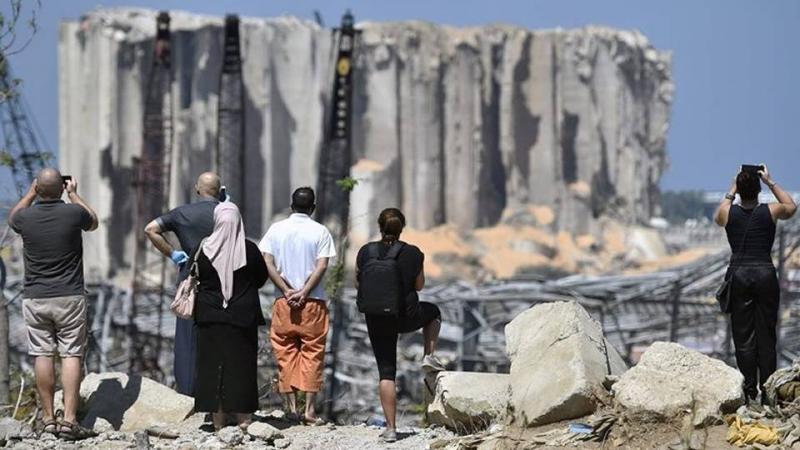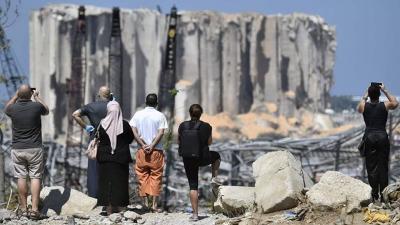On the second anniversary of the Beirut port explosion crime, there has been no new development regarding the investigation or the search for truth and justice, as if the families of the victims and the majority of Lebanese people need more than August 4 to realize this fact and achieve justice. The sight of the silos collapsing in the port is a stark indication of the collapse of justice, two years after the catastrophe that befell Beirut and its people, amid the deliberate paralysis of investigations led by the investigating judge, Tarek Bitar. Despite all the threats he has received from Hezbollah and various legal obstructions, he remains steadfast, refusing to step down from his mission.
Strangely, on this second anniversary, many senior officials have issued statements emphasizing the rule of law and justice, even though some of them are suspected or accused of obstructing the investigation and hindering the course of justice. Some even mockingly ask whether the Beirut port exploded by itself, as was the case with former Prime Minister Rafik Hariri.
In light of this obstruction in the investigation and the loss of trust in the Lebanese judiciary's ability to uncover the truth, efforts have begun to internationalize the issue by calling for a professional international fact-finding committee to investigate who brought ammonium nitrate to the port, who ordered its unloading from the ship in violation of regulations, who allowed it to remain in Hangar 12 for years, and who removed hundreds of tons of it.
The demands of the victims' families intersected with the efforts of opposition political forces through memos directed to the UN Human Rights Council, ambassadors from certain countries, and UN Secretary-General Antonio Guterres. Some families express disappointment with France, whose President Emmanuel Macron committed to assist in the investigation, yet no one has provided the Lebanese state with satellite images before and after the explosion, except for Russia, which did not contribute significantly. This has led some to doubt whether the truth will ever be revealed, especially since France and the United States previously sent expert teams to the Beirut port to conduct investigations without any known results.
Furthermore, there are suspicions that the crime scene may have been tampered with to conceal any evidence of Israel's involvement in the precise missile strike on the nitrate, alongside several mysterious crimes committed against individuals connected to the port or who may hold information regarding the nitrate, such as retired customs officer Joseph Skaff, who alerted authorities about the dangers of the nitrate to public safety; the murder of photographer Joe Bou Gani in front of his home; and the theft of his computer which contained images of a damaged security caravan at the port. There is also the assassination of Hezbollah opponent Loukman Slim, who linked the nitrate to the barrels used in bombarding Syrian cities. The collusion between external and internal parties to conceal evidence has led to connections being drawn between the disappearance of satellite images of the August 4 explosion and the expedited maritime border demarcation between Lebanon and Israel.
Simultaneously, questions arise as to why Judge Bitar, who refuses to step down under threats from Hezbollah's coordination officer Wafiq Safa, has not issued the awaited indictment to clarify matters. Additionally, if he indeed ruled out the hypothesis that the port was struck by a missile after testing the welding narrative, why has there been no clear conclusion?
In this context, Maronite Patriarch Bechara Boutros Al-Rahi urged the investigating judge to resume his work, noting during the commemoration of the second anniversary of the explosion that “suspending the investigation equates the innocent with the guilty.” He rejected the notion that some suspects are guilty and free while others are innocent and detained, including those who have alerted the relevant authorities without any response, and are still held for two years without trial. The patriarch's remarks clearly indicate the injustice faced by many detainees, including General Director of Customs Badri Daher and others who remain imprisoned, such as former General Director Shafiq Marai and contractor Salim Shibli.
According to information from "Al-Quds Al-Arabi," Badri Daher, who has been detained for two years, informed the investigating judge of his complete lack of knowledge regarding the ammonium nitrate issue. He stated that there was confusion about his role during the unloading and transfer of the nitrate to Hangar 12, as he was considered responsible for the manifest and customs storage related to that hangar. However, he had moved from the manifest department in July 2014, and the materials were unloaded four months later. Notably, Daher’s detention followed prior administrative accusations against him, depriving him of the right to defend himself, without being informed of the crime attributed to him or any available evidence against him, and he was not informed of the reasons for his detention.
Like Daher, several detainees have become victims of injustice after extending their detention without a clear resolution, beginning to feel the agony that will be psychologically difficult to erase and compensate for in the future. As Lebanese media previously avoided defending these detainees and discussing their situations for fear of discontent from the victims' families, they have begun to report on their conditions and welcome their families while receiving the victims' families, emphasizing that their cause is united in seeking truth and justice.
As the truth remains elusive, calls from the United Nations for urgent intervention and sending a fact-finding team to investigate the explosion continue, while some members of the ruling system, particularly those from the Free Patriotic Movement and Prime Minister-designate Najib Mikati, engage in harsh accusations of corruption, deals, and accusations rather than focusing on how to justly compensate the victims' families and the detainees.




